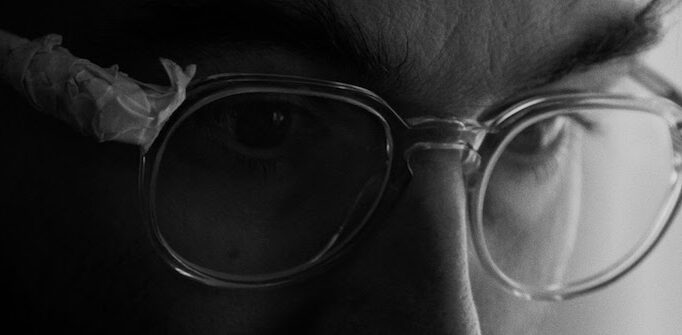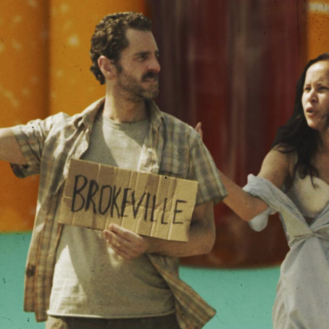By: Jeff Ching
“Writer’s block is B.S. You’re just lazy,” says anybody that isn’t a writer… and they should shut their mouths.
Writer’s block is no joke. It can last weeks, months, years. Hell, maybe even the rest of your life! That’s how I’ve been feeling lately, and it’s a scary thought. So, of course, writer’s block would be a great subject for a horror movie. Should I call Ghostwritten a first, or could you argue that The Shining was a horror about writer’s block? When people say that filmmakers are out of ideas, movies like Ghostwritten prove that there are still many anxieties out there for horror films to explore. Ghostwritten is ambitious, artsy in style, and definitely offers something different for its genre. I did ask myself at the end though, “was this a movie I admired more than I liked?”
Our protagonist is Guy Laury (Jay Duplass). He’s written a standalone one-hit novel, but that’s it. He’s in bad financial shape, he’s way behind on his payments for his mother’s long-term care, and his publisher’s patience about his lack of output is wearing thin. He really needs to deliver something – anything. Even though his life depends on it, every time he sits in front of his computer to write, he just stares at that dreaded blinking cursor in an empty document.
A potential cure for his writer’s block is proposed, however, when his publisher hooks him up with an invitation to a residency in Nantucket for two months. On paper, it seems like the best solution to eliminate all Guy’s distractions. Unfortunately, being secluded in the middle of nowhere in a big, old, creepy house has the possibility of doing quite the opposite. The floors and doors are creaky as hell, lights randomly turn on and off, and some of the shadows you see at night…wow, one of those jump scares legit gave me goosebumps. Oh right, and the house may be haunted by the ghost of a female author who lived there before, and may have been murdered for her work. As Guy struggles to write his book, he doesn’t know if he’s going crazy or if he’s being haunted by the previous tenant. He thinks he’s seeing her ghost.
Despite what should seem like ideal conditions to overcome writer’s block, the viewer barely ever witnesses Guy writing anything on his computer. Guy would rather do absolutely anything other than write. He’d rather go into the the town bar and drink, despite how weird, awkward and sketchy everyone at the bar is…or the whole town in general.
When Guy accidentally steps through a floorboard, he finds a manuscript for a book. Is this unpublished? He does a plagiarism check, and nope. This is unpublished. Did the girl write this before she was killed? Moral conundrum time. Obviously it’s wrong to steal someone else’s work and no one should know that better than a writer. On the other hand, life hasn’t been easy for him and he could lose everything if his writer’s block continues. This manuscript that otherwise would just literally collect dust could fix all of his financial problems and get his name back into the literary world. It’s easy for us to judge him, cross our arms, and say we’d never do something like this. But when you’re back is up against the wall like his, who knows? Though, how would a ghost react to seeing her work being stolen? Or was that whole set-up on purpose?
Now, I have had my fair share of writer’s block thinking about how to continue this review. I wish there was an “ending explained” video on YouTube, as writer/director Thomas Matthews provides a lot of twists and turns; with multiple scenarios dangled in front of the audience in the form of narrations and random videotapes of an expert discussing different states of paranormal activity. The house could be haunted. Sure, it could be her ghost. Or, it could be a far more nefarious demon. Or, maybe Guy is just going insane. I felt confused for a lot of Ghostwritten and hoped Matthews would clear up the threads by the conclusion. I have my rough interpretation of the end, but I’m also very open to the fact that I could be very wrong. Maybe the movie was meant to be left to the viewers’ interpretation? The audience has a push-pull relationship with Ghostwritten’s ambiguity but, ultimately, viewers will be intrigued throughout its slim runtime.
Aesthetically speaking, despite having a low budget, Ghostwritten is visually more interesting than a lot of mainstream horrors. The black-and-white cinematography is very effective for this story, and the occasional bursts of colour create a cool style. The jumpy narrative, which also mixes in home video footage, is a bit disorienting but, then again, that’s the intention. If the filmmakers just simply wanted to mess with the viewer’s head, then mission accomplished.
Apparently, Jay Duplass was the first choice for the role of Guy, and I can understand why. As one-half of The Duplass Brothers (sharing the indie filmmaking efforts with Creep star Mark Duplass), Jay is arguably better utilized as an actor. While the rest of Ghostwritten’s cast is quite solid, nobody steals this movie away from Duplass, who truly carries this ominous story and fully embodies this deeply wounded character. I know we’re still early in the year, but Jay Duplass’ work in Ghostwritten is an early contender for the best performance in a horror.
While the film isn’t necessarily suited for movie goers looking for a more traditional horror flick full of jump scares and conventional suspense, viewers with a more obscure taste who enjoy post-screening discussions will absolutely eat up Ghostwritten. You may be confused by it, but you’ll be gripped nonetheless.
Final rating ***1/2 (out of 5)
**********
Read more of Jeff Ching’s thoughts on film at The Ching of Comedy’s blog.




Be the first to comment